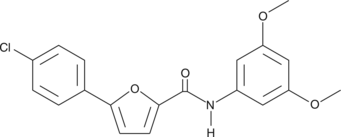Chemicals
Showing 7651–7800 of 41137 results
-
9(Z),11(Z)-Conjugated linoleic acid is an isomer of linoleic acid (Item No. 90150) that has been found in milk from cows and other animals.{41611,41612} It is cytotoxic to Caco-2 human colon cancer cells (EC50 = 446.1 µM) and induces changes in the miRNA profile, including an upregulation hsa-miR-146a-5p and downregulation of hsa-miR-32-5p, which is involved in apoptosis.{41613} [Matreya, LLC. Catalog No. 1248]
Brand:CaymanSKU:24582 - 10 mgAvailable on backorder
-
9(Z),11(Z)-Conjugated linoleic acid is an isomer of linoleic acid (Item No. 90150) that has been found in milk from cows and other animals.{41611,41612} It is cytotoxic to Caco-2 human colon cancer cells (EC50 = 446.1 µM) and induces changes in the miRNA profile, including an upregulation hsa-miR-146a-5p and downregulation of hsa-miR-32-5p, which is involved in apoptosis.{41613} [Matreya, LLC. Catalog No. 1248]
Brand:CaymanSKU:24582 - 25 mgAvailable on backorder
-
9(Z),11(Z)-Conjugated linoleic acid is an isomer of linoleic acid (Item No. 90150) that has been found in milk from cows and other animals.{41611,41612} It is cytotoxic to Caco-2 human colon cancer cells (EC50 = 446.1 µM) and induces changes in the miRNA profile, including an upregulation hsa-miR-146a-5p and downregulation of hsa-miR-32-5p, which is involved in apoptosis.{41613} [Matreya, LLC. Catalog No. 1248]
Brand:CaymanSKU:24582 - 5 mgAvailable on backorder
-
9(Z),11(Z)-Conjugated linoleic acid methyl ester has been used as a standard for the quantification of conjugated linoleic acid methyl esters by GC-MS.{38903} [Matreya, LLC. Catalog No. 1256]
Brand:CaymanSKU:24583 - 25 mgAvailable on backorder
-
9(Z),12(Z),15(Z),18(Z),21(Z)-Tetracosapentaenoic acid is an ω-3 very long-chain polyunsaturated fatty acid. It has been used to study the desaturation and elongation of ω-3 polyunsaturated fatty acids.{47030} It is elongated to form C26:5 or acted on by Δ6 desaturase to form C24:6. 9(Z),12(Z),15(Z),18(Z),21(Z)-Tetracosapentaenoic acid is found at low levels in mouse brain and spleen and levels decrease in the brain and spleen of old and exceptionally old mice.{47031}
Brand:CaymanSKU:10005157 - 100 µgAvailable on backorder
-
9(Z),12(Z),15(Z),18(Z),21(Z)-Tetracosapentaenoic acid is an ω-3 very long-chain polyunsaturated fatty acid. It has been used to study the desaturation and elongation of ω-3 polyunsaturated fatty acids.{47030} It is elongated to form C26:5 or acted on by Δ6 desaturase to form C24:6. 9(Z),12(Z),15(Z),18(Z),21(Z)-Tetracosapentaenoic acid is found at low levels in mouse brain and spleen and levels decrease in the brain and spleen of old and exceptionally old mice.{47031}
Brand:CaymanSKU:10005157 - 25 µgAvailable on backorder
-
9(Z),12(Z),15(Z),18(Z),21(Z)-Tetracosapentaenoic acid is an ω-3 very long-chain polyunsaturated fatty acid. It has been used to study the desaturation and elongation of ω-3 polyunsaturated fatty acids.{47030} It is elongated to form C26:5 or acted on by Δ6 desaturase to form C24:6. 9(Z),12(Z),15(Z),18(Z),21(Z)-Tetracosapentaenoic acid is found at low levels in mouse brain and spleen and levels decrease in the brain and spleen of old and exceptionally old mice.{47031}
Brand:CaymanSKU:10005157 - 250 µgAvailable on backorder
-
9(Z),12(Z),15(Z),18(Z),21(Z)-Tetracosapentaenoic acid is an ω-3 very long-chain polyunsaturated fatty acid. It has been used to study the desaturation and elongation of ω-3 polyunsaturated fatty acids.{47030} It is elongated to form C26:5 or acted on by Δ6 desaturase to form C24:6. 9(Z),12(Z),15(Z),18(Z),21(Z)-Tetracosapentaenoic acid is found at low levels in mouse brain and spleen and levels decrease in the brain and spleen of old and exceptionally old mice.{47031}
Brand:CaymanSKU:10005157 - 50 µgAvailable on backorder
-
9c(i472) is an inhibitor of 15-lipoxygenase-1 (15-LO-1; IC50 = 0.19 µM).{35962} It decreases LPS- and IFN-γ-induced NF-ĸB activity in RAW-Blue™ cells when used at concentrations of 0.2, 1, and 5 µM. 9c(i472) reduces LPS- and IFN-γ-induced increases in Nos2 expression and lipid peroxidation in RAW 264.7 cells when used at a concentration of 5 µM.
Brand:CaymanSKU:28225 - 1 mgAvailable on backorder
-
9c(i472) is an inhibitor of 15-lipoxygenase-1 (15-LO-1; IC50 = 0.19 µM).{35962} It decreases LPS- and IFN-γ-induced NF-ĸB activity in RAW-Blue™ cells when used at concentrations of 0.2, 1, and 5 µM. 9c(i472) reduces LPS- and IFN-γ-induced increases in Nos2 expression and lipid peroxidation in RAW 264.7 cells when used at a concentration of 5 µM.
Brand:CaymanSKU:28225 - 500 µgAvailable on backorder
-
A 26771B is a macrolide antibiotic originally isolated from P. turbatum.{53119} It is active against S. aureus, S. faecalis, V. coli, M. gallisepticum, M. granularum, M. synoviae, M. hyosynoviae, M. hyopneumoniae, E. amylovora, P. multocida, and X. phaseoli bacteria (MICs = S. aureus (MRSA) strains (MICs = 6-16 μg/ml).{40114} A 26771B is also active against C. tropicalis, T. mentagrophytes, B. cinerea, C. ulmi, and V. albo-atrum fungi (MICs = 6.25-100 μg/ml).{53119}
Brand:CaymanSKU:29593 - 1 mgAvailable on backorder
-
A 83-01 is an inhibitor of TGF-β type I receptor kinase (ALK5), activin type IB receptor (ALK4), and nodal type I receptor (ALK7) (IC50s = 12, 45, and 7.5 nM, respectively).{31358} It blocks the phosphorylation of SMAD2/3 and inhibits TGF-β-induced epithelial-to-mesenchymal transition.{31358} It has little effect on bone morphogenic type I receptors, p38 mitogen-activated protein kinase, or ERK.{31358} A 83-01 has been used to reprogram fibroblasts into alternative lineages, including neural stem cells and cardiomyocytes.{31142,31158}
Brand:CaymanSKU:9001799 - 1 mgAvailable on backorder
-
A 83-01 is an inhibitor of TGF-β type I receptor kinase (ALK5), activin type IB receptor (ALK4), and nodal type I receptor (ALK7) (IC50s = 12, 45, and 7.5 nM, respectively).{31358} It blocks the phosphorylation of SMAD2/3 and inhibits TGF-β-induced epithelial-to-mesenchymal transition.{31358} It has little effect on bone morphogenic type I receptors, p38 mitogen-activated protein kinase, or ERK.{31358} A 83-01 has been used to reprogram fibroblasts into alternative lineages, including neural stem cells and cardiomyocytes.{31142,31158}
Brand:CaymanSKU:9001799 - 10 mgAvailable on backorder
-
A 83-01 is an inhibitor of TGF-β type I receptor kinase (ALK5), activin type IB receptor (ALK4), and nodal type I receptor (ALK7) (IC50s = 12, 45, and 7.5 nM, respectively).{31358} It blocks the phosphorylation of SMAD2/3 and inhibits TGF-β-induced epithelial-to-mesenchymal transition.{31358} It has little effect on bone morphogenic type I receptors, p38 mitogen-activated protein kinase, or ERK.{31358} A 83-01 has been used to reprogram fibroblasts into alternative lineages, including neural stem cells and cardiomyocytes.{31142,31158}
Brand:CaymanSKU:9001799 - 25 mgAvailable on backorder
-
A 83-01 is an inhibitor of TGF-β type I receptor kinase (ALK5), activin type IB receptor (ALK4), and nodal type I receptor (ALK7) (IC50s = 12, 45, and 7.5 nM, respectively).{31358} It blocks the phosphorylation of SMAD2/3 and inhibits TGF-β-induced epithelial-to-mesenchymal transition.{31358} It has little effect on bone morphogenic type I receptors, p38 mitogen-activated protein kinase, or ERK.{31358} A 83-01 has been used to reprogram fibroblasts into alternative lineages, including neural stem cells and cardiomyocytes.{31142,31158}
Brand:CaymanSKU:9001799 - 5 mgAvailable on backorder
-
Brand:CaymanSKU:29783 - 1 mg
Available on backorder
-
Brand:CaymanSKU:29783 - 10 mg
Available on backorder
-
Brand:CaymanSKU:29783 - 25 mg
Available on backorder
-
Brand:CaymanSKU:29783 - 5 mg
Available on backorder
-
A-1120 is a non-retinoid retinol binding protein 4 (RBP4) antagonist (Ki = 8.3 nM for disruption of RBP4 binding to transthyretin).{58011} It is selective for RBP4 over cellular retinol binding protein 1 (CRBP1; IC50s = 0.09 and >30 µM, respectively, in radioligand binding assays), as well as a panel of G protein-coupled receptors, kinases, and enzymes. A-1120 (30 mg/kg) reduces serum levels of RBP4 and retinol in mice. It also inhibits retinal bisretinoid accumulation in the Abca4-/- mouse model of enhanced retinal lipofuscinogenesis-induced macular degeneration.{58012}
Brand:CaymanSKU:30921 - 10 mgAvailable on backorder
-
A-1120 is a non-retinoid retinol binding protein 4 (RBP4) antagonist (Ki = 8.3 nM for disruption of RBP4 binding to transthyretin).{58011} It is selective for RBP4 over cellular retinol binding protein 1 (CRBP1; IC50s = 0.09 and >30 µM, respectively, in radioligand binding assays), as well as a panel of G protein-coupled receptors, kinases, and enzymes. A-1120 (30 mg/kg) reduces serum levels of RBP4 and retinol in mice. It also inhibits retinal bisretinoid accumulation in the Abca4-/- mouse model of enhanced retinal lipofuscinogenesis-induced macular degeneration.{58012}
Brand:CaymanSKU:30921 - 5 mgAvailable on backorder
-
A-1155463 is an inhibitor of Bcl-xL (Ki = is = 80 and 16 nM, respectively). A-1155463 inhibits the growth of H146 small cell lung cancer cells (EC50 = 65 nM). In vivo, A-1155463 (5 mg/kg, i.p.) reduces tumor volume in an H146 mouse xenograft model. A-1155463 also induces premature apoptosis in influenza A-infected cells (EC50 = <10 nM).{46183}
Brand:CaymanSKU:27369 - 1 mgAvailable on backorder
-
A-1155463 is an inhibitor of Bcl-xL (Ki = is = 80 and 16 nM, respectively). A-1155463 inhibits the growth of H146 small cell lung cancer cells (EC50 = 65 nM). In vivo, A-1155463 (5 mg/kg, i.p.) reduces tumor volume in an H146 mouse xenograft model. A-1155463 also induces premature apoptosis in influenza A-infected cells (EC50 = <10 nM).{46183}
Brand:CaymanSKU:27369 - 10 mgAvailable on backorder
-
A-1155463 is an inhibitor of Bcl-xL (Ki = is = 80 and 16 nM, respectively). A-1155463 inhibits the growth of H146 small cell lung cancer cells (EC50 = 65 nM). In vivo, A-1155463 (5 mg/kg, i.p.) reduces tumor volume in an H146 mouse xenograft model. A-1155463 also induces premature apoptosis in influenza A-infected cells (EC50 = <10 nM).{46183}
Brand:CaymanSKU:27369 - 25 mgAvailable on backorder
-
A-1155463 is an inhibitor of Bcl-xL (Ki = is = 80 and 16 nM, respectively). A-1155463 inhibits the growth of H146 small cell lung cancer cells (EC50 = 65 nM). In vivo, A-1155463 (5 mg/kg, i.p.) reduces tumor volume in an H146 mouse xenograft model. A-1155463 also induces premature apoptosis in influenza A-infected cells (EC50 = <10 nM).{46183}
Brand:CaymanSKU:27369 - 5 mgAvailable on backorder
-
A-1210477 is an inhibitor of the antiapoptotic Bcl-2 family protein myeloid cell leukemia-1 (Mcl-1; Ki = 0.43 nM and IC50 = 26.2 nM) that demonstrates >100-fold selectivity over other Bcl-2 family members (Kis > 0.66 µM for Bcl-2, Bcl-XL, Bcl-W, and Bfl-1).{32901,32902,32900} It has been shown to disrupt the interaction between Mcl-1 and pro-apoptotic BIM, inducing the hallmarks of apoptosis in Mcl-1-dependent multiple myeloma and non-small cell lung cancer cell lines.{32901,32900}
Brand:CaymanSKU:21113 -Out of stock
-
A-1210477 is an inhibitor of the antiapoptotic Bcl-2 family protein myeloid cell leukemia-1 (Mcl-1; Ki = 0.43 nM and IC50 = 26.2 nM) that demonstrates >100-fold selectivity over other Bcl-2 family members (Kis > 0.66 µM for Bcl-2, Bcl-XL, Bcl-W, and Bfl-1).{32901,32902,32900} It has been shown to disrupt the interaction between Mcl-1 and pro-apoptotic BIM, inducing the hallmarks of apoptosis in Mcl-1-dependent multiple myeloma and non-small cell lung cancer cell lines.{32901,32900}
Brand:CaymanSKU:21113 -Out of stock
-
A-1210477 is an inhibitor of the antiapoptotic Bcl-2 family protein myeloid cell leukemia-1 (Mcl-1; Ki = 0.43 nM and IC50 = 26.2 nM) that demonstrates >100-fold selectivity over other Bcl-2 family members (Kis > 0.66 µM for Bcl-2, Bcl-XL, Bcl-W, and Bfl-1).{32901,32902,32900} It has been shown to disrupt the interaction between Mcl-1 and pro-apoptotic BIM, inducing the hallmarks of apoptosis in Mcl-1-dependent multiple myeloma and non-small cell lung cancer cell lines.{32901,32900}
Brand:CaymanSKU:21113 -Out of stock
-
A-1210477 is an inhibitor of the antiapoptotic Bcl-2 family protein myeloid cell leukemia-1 (Mcl-1; Ki = 0.43 nM and IC50 = 26.2 nM) that demonstrates >100-fold selectivity over other Bcl-2 family members (Kis > 0.66 µM for Bcl-2, Bcl-XL, Bcl-W, and Bfl-1).{32901,32902,32900} It has been shown to disrupt the interaction between Mcl-1 and pro-apoptotic BIM, inducing the hallmarks of apoptosis in Mcl-1-dependent multiple myeloma and non-small cell lung cancer cell lines.{32901,32900}
Brand:CaymanSKU:21113 -Out of stock
-
A-1331852 is an orally bioavailable Bcl-xL inhibitor that selectively binds Bcl-xL over Bcl-2, Mcl-1, and Bcl-W (Kis = in vitro (EC50s = 6 and >5,000 nM, respectively). A-1331852 (25 mg/kg twice per day) inhibits tumor growth in a MOLT-4 mouse xenograft model. It also inhibits tumor growth and increases the antitumor activity of docetaxel (Item No. 11637) in MDA-MB-231 LC3 metastatic breast cancer and NCI-H1650 non-small cell lung cancer mouse xenograft models when administered at a dose of 25 mg/kg. A-1331852 also increases venetoclax inhibition of tumor growth in an NCI-H1963.FP5 small cell lung cancer mouse xenograft model.
Brand:CaymanSKU:22963 - 1 mgAvailable on backorder
-
A-1331852 is an orally bioavailable Bcl-xL inhibitor that selectively binds Bcl-xL over Bcl-2, Mcl-1, and Bcl-W (Kis = in vitro (EC50s = 6 and >5,000 nM, respectively). A-1331852 (25 mg/kg twice per day) inhibits tumor growth in a MOLT-4 mouse xenograft model. It also inhibits tumor growth and increases the antitumor activity of docetaxel (Item No. 11637) in MDA-MB-231 LC3 metastatic breast cancer and NCI-H1650 non-small cell lung cancer mouse xenograft models when administered at a dose of 25 mg/kg. A-1331852 also increases venetoclax inhibition of tumor growth in an NCI-H1963.FP5 small cell lung cancer mouse xenograft model.
Brand:CaymanSKU:22963 - 10 mgAvailable on backorder
-
A-1331852 is an orally bioavailable Bcl-xL inhibitor that selectively binds Bcl-xL over Bcl-2, Mcl-1, and Bcl-W (Kis = in vitro (EC50s = 6 and >5,000 nM, respectively). A-1331852 (25 mg/kg twice per day) inhibits tumor growth in a MOLT-4 mouse xenograft model. It also inhibits tumor growth and increases the antitumor activity of docetaxel (Item No. 11637) in MDA-MB-231 LC3 metastatic breast cancer and NCI-H1650 non-small cell lung cancer mouse xenograft models when administered at a dose of 25 mg/kg. A-1331852 also increases venetoclax inhibition of tumor growth in an NCI-H1963.FP5 small cell lung cancer mouse xenograft model.
Brand:CaymanSKU:22963 - 5 mgAvailable on backorder
-
A-196 is a selective inhibitor of SUV420H1 and SUV420H2 (IC50s = 25 and 144 nM, respectively) that is more than 100-fold selective over other histone methyltransferases and non-epigenetic targets. A-196 has been shown to inhibit the di- and tri-methylation of lysine 20 of histone H4 (H4K20me) in multiple cell lines with IC50 values less than 1 μM. For more information on A-196 please visit the Structural Genomics Consortium (SGC). The negative control, SGC2043 (A-197), for A-196 is also available exclusively through the SGC. You can submit a request to receive the negative control here.
Brand:CaymanSKU:-Available on backorder
-
A-196 is a selective inhibitor of SUV420H1 and SUV420H2 (IC50s = 25 and 144 nM, respectively) that is more than 100-fold selective over other histone methyltransferases and non-epigenetic targets. A-196 has been shown to inhibit the di- and tri-methylation of lysine 20 of histone H4 (H4K20me) in multiple cell lines with IC50 values less than 1 μM. For more information on A-196 please visit the Structural Genomics Consortium (SGC). The negative control, SGC2043 (A-197), for A-196 is also available exclusively through the SGC. You can submit a request to receive the negative control here.
Brand:CaymanSKU:-Available on backorder
-
A-196 is a selective inhibitor of SUV420H1 and SUV420H2 (IC50s = 25 and 144 nM, respectively) that is more than 100-fold selective over other histone methyltransferases and non-epigenetic targets. A-196 has been shown to inhibit the di- and tri-methylation of lysine 20 of histone H4 (H4K20me) in multiple cell lines with IC50 values less than 1 μM. For more information on A-196 please visit the Structural Genomics Consortium (SGC). The negative control, SGC2043 (A-197), for A-196 is also available exclusively through the SGC. You can submit a request to receive the negative control here.
Brand:CaymanSKU:-Available on backorder
-
A-205804 is a potent inhibitor of E-selectin and ICAM-1 expression in human vascular endothelial cells stimulated with TNF-α (IC50s = 20 and 25 nM, respectively).{33381} It does not block expression of VCAM-1 (IC50 > 1,000 nM).
Brand:CaymanSKU:21252 -Out of stock
-
A-205804 is a potent inhibitor of E-selectin and ICAM-1 expression in human vascular endothelial cells stimulated with TNF-α (IC50s = 20 and 25 nM, respectively).{33381} It does not block expression of VCAM-1 (IC50 > 1,000 nM).
Brand:CaymanSKU:21252 -Out of stock
-
A-205804 is a potent inhibitor of E-selectin and ICAM-1 expression in human vascular endothelial cells stimulated with TNF-α (IC50s = 20 and 25 nM, respectively).{33381} It does not block expression of VCAM-1 (IC50 > 1,000 nM).
Brand:CaymanSKU:21252 -Out of stock
-
A-205804 is a potent inhibitor of E-selectin and ICAM-1 expression in human vascular endothelial cells stimulated with TNF-α (IC50s = 20 and 25 nM, respectively).{33381} It does not block expression of VCAM-1 (IC50 > 1,000 nM).
Brand:CaymanSKU:21252 -Out of stock
-
A-317491 is a non-nucleotide antagonist of the purinergic receptors P2X3 and P2X2/3 (Kis = 22-92 nM in a calcium influx assay) that is selective over other purinergic and neurotransmitter receptors, ion channels, and enzymes (IC50s = >10 µM).{39363} It reduces thermal hyperalgesia induced by complete Freund’s adjuvant in rats (ED50 = 30 µmol/kg, s.c.) and nociceptive responses to chemically-induced pain. Chronic administration of A-317491 (30 µmol/kg, twice daily) reduces early, but not late, phase pain in a mouse model of bone cancer.{39362} A-317491 does not readily cross the blood-brain barrier and reduces pain responses when applied topically in a rat model of inflammatory pain, indicating that it acts primarily at peripheral purinergic receptors.{39364}
Brand:CaymanSKU:-Available on backorder
-
A-317491 is a non-nucleotide antagonist of the purinergic receptors P2X3 and P2X2/3 (Kis = 22-92 nM in a calcium influx assay) that is selective over other purinergic and neurotransmitter receptors, ion channels, and enzymes (IC50s = >10 µM).{39363} It reduces thermal hyperalgesia induced by complete Freund’s adjuvant in rats (ED50 = 30 µmol/kg, s.c.) and nociceptive responses to chemically-induced pain. Chronic administration of A-317491 (30 µmol/kg, twice daily) reduces early, but not late, phase pain in a mouse model of bone cancer.{39362} A-317491 does not readily cross the blood-brain barrier and reduces pain responses when applied topically in a rat model of inflammatory pain, indicating that it acts primarily at peripheral purinergic receptors.{39364}
Brand:CaymanSKU:-Available on backorder
-
A-317491 is a non-nucleotide antagonist of the purinergic receptors P2X3 and P2X2/3 (Kis = 22-92 nM in a calcium influx assay) that is selective over other purinergic and neurotransmitter receptors, ion channels, and enzymes (IC50s = >10 µM).{39363} It reduces thermal hyperalgesia induced by complete Freund’s adjuvant in rats (ED50 = 30 µmol/kg, s.c.) and nociceptive responses to chemically-induced pain. Chronic administration of A-317491 (30 µmol/kg, twice daily) reduces early, but not late, phase pain in a mouse model of bone cancer.{39362} A-317491 does not readily cross the blood-brain barrier and reduces pain responses when applied topically in a rat model of inflammatory pain, indicating that it acts primarily at peripheral purinergic receptors.{39364}
Brand:CaymanSKU:-Available on backorder
-
A-317491 is a non-nucleotide antagonist of the purinergic receptors P2X3 and P2X2/3 (Kis = 22-92 nM in a calcium influx assay) that is selective over other purinergic and neurotransmitter receptors, ion channels, and enzymes (IC50s = >10 µM).{39363} It reduces thermal hyperalgesia induced by complete Freund’s adjuvant in rats (ED50 = 30 µmol/kg, s.c.) and nociceptive responses to chemically-induced pain. Chronic administration of A-317491 (30 µmol/kg, twice daily) reduces early, but not late, phase pain in a mouse model of bone cancer.{39362} A-317491 does not readily cross the blood-brain barrier and reduces pain responses when applied topically in a rat model of inflammatory pain, indicating that it acts primarily at peripheral purinergic receptors.{39364}
Brand:CaymanSKU:-Available on backorder
-
A-366 is a potent, peptide-competitive inhibitor of the lysine methyltransferase G9a (IC50 = 3.3 nM).{26028} It displays greater than 1,000-fold selectivity over 21 other methyltransferases.{26028} A-366 significantly reduces the cellular levels of dimethylation on histone 3 at lysine 9 (H3K9Me2) in PC3 cells without reducing total histone 3, H3K27Me3, or H3K36Me2.{26028} It also blocks the interaction of the methyl lysine reader protein Spindlin1 with H3K4me3 by binding with a Spindlin1 Tudor domain (Kd = 111 nM).{30715} See the Structural Genomics Consortium (SGC) website for more information.
Brand:CaymanSKU:- -
A-366 is a potent, peptide-competitive inhibitor of the lysine methyltransferase G9a (IC50 = 3.3 nM).{26028} It displays greater than 1,000-fold selectivity over 21 other methyltransferases.{26028} A-366 significantly reduces the cellular levels of dimethylation on histone 3 at lysine 9 (H3K9Me2) in PC3 cells without reducing total histone 3, H3K27Me3, or H3K36Me2.{26028} It also blocks the interaction of the methyl lysine reader protein Spindlin1 with H3K4me3 by binding with a Spindlin1 Tudor domain (Kd = 111 nM).{30715} See the Structural Genomics Consortium (SGC) website for more information.
Brand:CaymanSKU:- -
A-366 is a potent, peptide-competitive inhibitor of the lysine methyltransferase G9a (IC50 = 3.3 nM).{26028} It displays greater than 1,000-fold selectivity over 21 other methyltransferases.{26028} A-366 significantly reduces the cellular levels of dimethylation on histone 3 at lysine 9 (H3K9Me2) in PC3 cells without reducing total histone 3, H3K27Me3, or H3K36Me2.{26028} It also blocks the interaction of the methyl lysine reader protein Spindlin1 with H3K4me3 by binding with a Spindlin1 Tudor domain (Kd = 111 nM).{30715} See the Structural Genomics Consortium (SGC) website for more information.
Brand:CaymanSKU:- -
A-39183A is an active component of the A-39183 antibiotic complex produced by aerobic fermentation of Streptomyces NRRL 12049.{38264} It has activity against penicillin-resistant S. aureus 3055 and S. faecalis X66 (MICs = 32 and 32 μg/ml, respectively) and a variety of Gram-positive and Gram-negative anaerobic bacteria (MICs = 16-128 μg/ml) in an agar dilution assay.
Brand:CaymanSKU:23239 - 1 mgAvailable on backorder
-
A-39183A is an active component of the A-39183 antibiotic complex produced by aerobic fermentation of Streptomyces NRRL 12049.{38264} It has activity against penicillin-resistant S. aureus 3055 and S. faecalis X66 (MICs = 32 and 32 μg/ml, respectively) and a variety of Gram-positive and Gram-negative anaerobic bacteria (MICs = 16-128 μg/ml) in an agar dilution assay.
Brand:CaymanSKU:23239 - 5 mgAvailable on backorder
-
A-419259 is an inhibitor of Src family kinases, including Src, LCK, Lyn, and Hck (IC50s = 9, 50 = 3,000 nM) and PKC (IC50 = >33 μM).{29932} A-419259 inhibits growth of Philadelphia chromosome-positive (Ph+) K-562 and Meg-01 myeloid leukemia cells (IC50s = 0.1-0.3 and 0.1 μM, respectively), but not Ph- TF-1 and HEL cells. It induces apoptosis in K-562 cells in a concentration-dependent manner. A-419259 (300 nM) inhibits differentiation of murine embryonic stem cells while maintaining pluripotency.{29929} It reduces the total number of acute myeloid leukemia (AML) cells, as well as AML stem cells, in the bone marrow and spleen in mouse patient-derived xenograft (PDX) models of AML when administered at a dose of 30 mg/kg twice daily.{41984}
Brand:CaymanSKU:25605 - 1 mgAvailable on backorder
-
A-419259 is an inhibitor of Src family kinases, including Src, LCK, Lyn, and Hck (IC50s = 9, 50 = 3,000 nM) and PKC (IC50 = >33 μM).{29932} A-419259 inhibits growth of Philadelphia chromosome-positive (Ph+) K-562 and Meg-01 myeloid leukemia cells (IC50s = 0.1-0.3 and 0.1 μM, respectively), but not Ph- TF-1 and HEL cells. It induces apoptosis in K-562 cells in a concentration-dependent manner. A-419259 (300 nM) inhibits differentiation of murine embryonic stem cells while maintaining pluripotency.{29929} It reduces the total number of acute myeloid leukemia (AML) cells, as well as AML stem cells, in the bone marrow and spleen in mouse patient-derived xenograft (PDX) models of AML when administered at a dose of 30 mg/kg twice daily.{41984}
Brand:CaymanSKU:25605 - 10 mgAvailable on backorder
-
A-419259 is an inhibitor of Src family kinases, including Src, LCK, Lyn, and Hck (IC50s = 9, 50 = 3,000 nM) and PKC (IC50 = >33 μM).{29932} A-419259 inhibits growth of Philadelphia chromosome-positive (Ph+) K-562 and Meg-01 myeloid leukemia cells (IC50s = 0.1-0.3 and 0.1 μM, respectively), but not Ph- TF-1 and HEL cells. It induces apoptosis in K-562 cells in a concentration-dependent manner. A-419259 (300 nM) inhibits differentiation of murine embryonic stem cells while maintaining pluripotency.{29929} It reduces the total number of acute myeloid leukemia (AML) cells, as well as AML stem cells, in the bone marrow and spleen in mouse patient-derived xenograft (PDX) models of AML when administered at a dose of 30 mg/kg twice daily.{41984}
Brand:CaymanSKU:25605 - 5 mgAvailable on backorder
-
A-419259 is an inhibitor of Src family kinases, including Src, LCK, Lyn, and Hck (IC50s = 9, 50 = 3,000 nM) and PKC (IC50 = >33 μM).{29932} A-419259 inhibits growth of Philadelphia chromosome-positive (Ph+) K-562 and Meg-01 myeloid leukemia cells (IC50s = 0.1-0.3 and 0.1 μM, respectively), but not Ph- TF-1 and HEL cells. It induces apoptosis in K-562 cells in a concentration-dependent manner. A-419259 (300 nM) inhibits differentiation of murine embryonic stem cells while maintaining pluripotency.{29929} It reduces the total number of acute myeloid leukemia (AML) cells, as well as AML stem cells, in the bone marrow and spleen in mouse patient-derived xenograft (PDX) models of AML when administered at a dose of 30 mg/kg twice daily.{41984}
Brand:CaymanSKU:25605 - 500 µgAvailable on backorder
-
A-419259 is an inhibitor of Src family kinases, including Src, LCK, Lyn, and Hck (IC50s = 9, 50 = 3,000 nM) and PKC (IC50 = >33 μM).{29932} A-419259 inhibits growth of Philadelphia chromosome-positive (Ph+) K-562 and Meg-01 myeloid leukemia cells (IC50s = 0.1-0.3 and 0.1 μM, respectively), but not Ph- TF-1 and HEL cells. It induces apoptosis in K-562 cells in a concentration-dependent manner. A-419259 (300 nM) inhibits differentiation of murine embryonic stem cells while maintaining pluripotency.{29929} It reduces the total number of acute myeloid leukemia (AML) cells, as well as AML stem cells, in the bone marrow and spleen in mouse patient-derived xenograft (PDX) models of AML when administered at a dose of 30 mg/kg twice daily.{41984}
Brand:CaymanSKU:-Available on backorder
-
A-419259 is an inhibitor of Src family kinases, including Src, LCK, Lyn, and Hck (IC50s = 9, 50 = 3,000 nM) and PKC (IC50 = >33 μM).{29932} A-419259 inhibits growth of Philadelphia chromosome-positive (Ph+) K-562 and Meg-01 myeloid leukemia cells (IC50s = 0.1-0.3 and 0.1 μM, respectively), but not Ph- TF-1 and HEL cells. It induces apoptosis in K-562 cells in a concentration-dependent manner. A-419259 (300 nM) inhibits differentiation of murine embryonic stem cells while maintaining pluripotency.{29929} It reduces the total number of acute myeloid leukemia (AML) cells, as well as AML stem cells, in the bone marrow and spleen in mouse patient-derived xenograft (PDX) models of AML when administered at a dose of 30 mg/kg twice daily.{41984}
Brand:CaymanSKU:-Available on backorder
-
A-419259 is an inhibitor of Src family kinases, including Src, LCK, Lyn, and Hck (IC50s = 9, 50 = 3,000 nM) and PKC (IC50 = >33 μM).{29932} A-419259 inhibits growth of Philadelphia chromosome-positive (Ph+) K-562 and Meg-01 myeloid leukemia cells (IC50s = 0.1-0.3 and 0.1 μM, respectively), but not Ph- TF-1 and HEL cells. It induces apoptosis in K-562 cells in a concentration-dependent manner. A-419259 (300 nM) inhibits differentiation of murine embryonic stem cells while maintaining pluripotency.{29929} It reduces the total number of acute myeloid leukemia (AML) cells, as well as AML stem cells, in the bone marrow and spleen in mouse patient-derived xenograft (PDX) models of AML when administered at a dose of 30 mg/kg twice daily.{41984}
Brand:CaymanSKU:-Available on backorder
-
A-419259 is an inhibitor of Src family kinases, including Src, LCK, Lyn, and Hck (IC50s = 9, 50 = 3,000 nM) and PKC (IC50 = >33 μM).{29932} A-419259 inhibits growth of Philadelphia chromosome-positive (Ph+) K-562 and Meg-01 myeloid leukemia cells (IC50s = 0.1-0.3 and 0.1 μM, respectively), but not Ph- TF-1 and HEL cells. It induces apoptosis in K-562 cells in a concentration-dependent manner. A-419259 (300 nM) inhibits differentiation of murine embryonic stem cells while maintaining pluripotency.{29929} It reduces the total number of acute myeloid leukemia (AML) cells, as well as AML stem cells, in the bone marrow and spleen in mouse patient-derived xenograft (PDX) models of AML when administered at a dose of 30 mg/kg twice daily.{41984}
Brand:CaymanSKU:-Available on backorder
-
A-438079 is a competitive antagonist of the nucleotide receptor P2X7 (pIC50 = 6.9).{22914} It inhibits both calcium flux and IL-1β release mediated by P2X7 while not affecting the activity of other P2X receptors.{22914,22913} A-438079 is effective in evaluating the role of P2X7 in nociception, oxidative stress, and apoptosis in cells and animals.{22915,22916,22917}
Brand:CaymanSKU:- -
A-438079 is a competitive antagonist of the nucleotide receptor P2X7 (pIC50 = 6.9).{22914} It inhibits both calcium flux and IL-1β release mediated by P2X7 while not affecting the activity of other P2X receptors.{22914,22913} A-438079 is effective in evaluating the role of P2X7 in nociception, oxidative stress, and apoptosis in cells and animals.{22915,22916,22917}
Brand:CaymanSKU:- -
A-438079 is a competitive antagonist of the nucleotide receptor P2X7 (pIC50 = 6.9).{22914} It inhibits both calcium flux and IL-1β release mediated by P2X7 while not affecting the activity of other P2X receptors.{22914,22913} A-438079 is effective in evaluating the role of P2X7 in nociception, oxidative stress, and apoptosis in cells and animals.{22915,22916,22917}
Brand:CaymanSKU:- -
A-438079 is a competitive antagonist of the nucleotide receptor P2X7 (pIC50 = 6.9).{22914} It inhibits both calcium flux and IL-1β release mediated by P2X7 while not affecting the activity of other P2X receptors.{22914,22913} A-438079 is effective in evaluating the role of P2X7 in nociception, oxidative stress, and apoptosis in cells and animals.{22915,22916,22917}
Brand:CaymanSKU:- -
Three related forms of the kinase Akt (1, 2, 3, also known as protein kinase B isoforms PKBα, β, γ) modulate cell proliferation, metabolism, and survival as well as angiogenesis. A-443654 is an inhibitor of Akt (Ki = 160 pmol/L for all three isoforms) that interferes with mitotic progression and bipolar spindle formation.{26942,26944} It induces G2/M accumulation, defects in centrosome separation, and formation of either monopolar arrays or disorganized spindles.{26944} A-443654 has been reported to slow the progression of Akt-dependent tumors in in vivo mouse models.{26942} In response to an A-443654-induced decrease in phosphorylation of Akt targets, a concomitant increase in Thr308 and Ser473 phosphorylation of Akt has been observed in human cancer cell lines.{26943} A-443654 has been used to examine the mechanism of this rapid feedback reaction.
Brand:CaymanSKU:-Out of stock
-
Three related forms of the kinase Akt (1, 2, 3, also known as protein kinase B isoforms PKBα, β, γ) modulate cell proliferation, metabolism, and survival as well as angiogenesis. A-443654 is an inhibitor of Akt (Ki = 160 pmol/L for all three isoforms) that interferes with mitotic progression and bipolar spindle formation.{26942,26944} It induces G2/M accumulation, defects in centrosome separation, and formation of either monopolar arrays or disorganized spindles.{26944} A-443654 has been reported to slow the progression of Akt-dependent tumors in in vivo mouse models.{26942} In response to an A-443654-induced decrease in phosphorylation of Akt targets, a concomitant increase in Thr308 and Ser473 phosphorylation of Akt has been observed in human cancer cell lines.{26943} A-443654 has been used to examine the mechanism of this rapid feedback reaction.
Brand:CaymanSKU:-Out of stock
-
Three related forms of the kinase Akt (1, 2, 3, also known as protein kinase B isoforms PKBα, β, γ) modulate cell proliferation, metabolism, and survival as well as angiogenesis. A-443654 is an inhibitor of Akt (Ki = 160 pmol/L for all three isoforms) that interferes with mitotic progression and bipolar spindle formation.{26942,26944} It induces G2/M accumulation, defects in centrosome separation, and formation of either monopolar arrays or disorganized spindles.{26944} A-443654 has been reported to slow the progression of Akt-dependent tumors in in vivo mouse models.{26942} In response to an A-443654-induced decrease in phosphorylation of Akt targets, a concomitant increase in Thr308 and Ser473 phosphorylation of Akt has been observed in human cancer cell lines.{26943} A-443654 has been used to examine the mechanism of this rapid feedback reaction.
Brand:CaymanSKU:-Out of stock
-
A-484954 is an ATP-competitive inhibitor of eukaryotic elongation factor-2 kinase (eEF-2K; IC50 = 420 nM).{51146} It reduces eEF-2K autophosphorylation in PC3, HeLa, H460, H1299, and MDA-MB-231 cancer cells when used at a concentration of 75 μM.
Brand:CaymanSKU:28279 - 1 mgAvailable on backorder
-
A-484954 is an ATP-competitive inhibitor of eukaryotic elongation factor-2 kinase (eEF-2K; IC50 = 420 nM).{51146} It reduces eEF-2K autophosphorylation in PC3, HeLa, H460, H1299, and MDA-MB-231 cancer cells when used at a concentration of 75 μM.
Brand:CaymanSKU:28279 - 10 mgAvailable on backorder
-
A-484954 is an ATP-competitive inhibitor of eukaryotic elongation factor-2 kinase (eEF-2K; IC50 = 420 nM).{51146} It reduces eEF-2K autophosphorylation in PC3, HeLa, H460, H1299, and MDA-MB-231 cancer cells when used at a concentration of 75 μM.
Brand:CaymanSKU:28279 - 25 mgAvailable on backorder
-
A-484954 is an ATP-competitive inhibitor of eukaryotic elongation factor-2 kinase (eEF-2K; IC50 = 420 nM).{51146} It reduces eEF-2K autophosphorylation in PC3, HeLa, H460, H1299, and MDA-MB-231 cancer cells when used at a concentration of 75 μM.
Brand:CaymanSKU:28279 - 5 mgAvailable on backorder
-
A-485 is an inhibitor of the histone acetyltransferase p300/CBP (IC50 = 60 nM).{40422} It decreases acetylated histone H3 lysine 27 (H3K27Ac), but not H3K9Ac, levels in PC3 cells in a concentration-dependent manner. A-485 reduces proliferation of non-small cell lung cancer (NSCLC), small cell lung cancer, triple-negative breast cancer, mantel cell lymphoma, multiple myeloma, non-Hodgkin’s, and acute myeloid leukemia cell lines. It inhibits expression of prostate specific antigen (PSA) and H3K27Ac occupancy at the PSA enhancer without inhibiting androgen receptor occupancy in LNCaP-FGC cells. A-485 reduces tumor volume in a LuCaP-77 mouse xenograft model of castration-resistant prostate cancer when administered at a dose of 100 mg twice per day for 21 days.
Brand:CaymanSKU:24119 - 1 mgAvailable on backorder
-
A-485 is an inhibitor of the histone acetyltransferase p300/CBP (IC50 = 60 nM).{40422} It decreases acetylated histone H3 lysine 27 (H3K27Ac), but not H3K9Ac, levels in PC3 cells in a concentration-dependent manner. A-485 reduces proliferation of non-small cell lung cancer (NSCLC), small cell lung cancer, triple-negative breast cancer, mantel cell lymphoma, multiple myeloma, non-Hodgkin’s, and acute myeloid leukemia cell lines. It inhibits expression of prostate specific antigen (PSA) and H3K27Ac occupancy at the PSA enhancer without inhibiting androgen receptor occupancy in LNCaP-FGC cells. A-485 reduces tumor volume in a LuCaP-77 mouse xenograft model of castration-resistant prostate cancer when administered at a dose of 100 mg twice per day for 21 days.
Brand:CaymanSKU:24119 - 10 mgAvailable on backorder
-
A-485 is an inhibitor of the histone acetyltransferase p300/CBP (IC50 = 60 nM).{40422} It decreases acetylated histone H3 lysine 27 (H3K27Ac), but not H3K9Ac, levels in PC3 cells in a concentration-dependent manner. A-485 reduces proliferation of non-small cell lung cancer (NSCLC), small cell lung cancer, triple-negative breast cancer, mantel cell lymphoma, multiple myeloma, non-Hodgkin’s, and acute myeloid leukemia cell lines. It inhibits expression of prostate specific antigen (PSA) and H3K27Ac occupancy at the PSA enhancer without inhibiting androgen receptor occupancy in LNCaP-FGC cells. A-485 reduces tumor volume in a LuCaP-77 mouse xenograft model of castration-resistant prostate cancer when administered at a dose of 100 mg twice per day for 21 days.
Brand:CaymanSKU:24119 - 25 mgAvailable on backorder
-
A-485 is an inhibitor of the histone acetyltransferase p300/CBP (IC50 = 60 nM).{40422} It decreases acetylated histone H3 lysine 27 (H3K27Ac), but not H3K9Ac, levels in PC3 cells in a concentration-dependent manner. A-485 reduces proliferation of non-small cell lung cancer (NSCLC), small cell lung cancer, triple-negative breast cancer, mantel cell lymphoma, multiple myeloma, non-Hodgkin’s, and acute myeloid leukemia cell lines. It inhibits expression of prostate specific antigen (PSA) and H3K27Ac occupancy at the PSA enhancer without inhibiting androgen receptor occupancy in LNCaP-FGC cells. A-485 reduces tumor volume in a LuCaP-77 mouse xenograft model of castration-resistant prostate cancer when administered at a dose of 100 mg twice per day for 21 days.
Brand:CaymanSKU:24119 - 5 mgAvailable on backorder
-
A-54556A is a natural acyldepsipeptide (ADEP) antibiotic isolated from the fermentation broth of S. hawaiiensis.{24688} Like other ADEP antibiotics, A-54556A binds to the ATP-dependent Clp protease proteolytic subunit ClpP, resulting in constitutive activation of this bacterial protease.{27768,27766,27765} This leads to uncontrolled proteolysis, inhibition of bacterial cell division, and, ultimately, cell death.{24688,27767} A-54556A preferentially targets Gram-positive bacteria, including staphylococci, streptococci, and enterococci, with minimum inhibitory concentration values in the submicrogram/milliliter range.{27767} ADEP antibiotics are effective against chronic infections as they are able to eradicate chronic biofilm infections, particularly when combined with rifampicin.{24689}
Brand:CaymanSKU:- -
A-54556A is a natural acyldepsipeptide (ADEP) antibiotic isolated from the fermentation broth of S. hawaiiensis.{24688} Like other ADEP antibiotics, A-54556A binds to the ATP-dependent Clp protease proteolytic subunit ClpP, resulting in constitutive activation of this bacterial protease.{27768,27766,27765} This leads to uncontrolled proteolysis, inhibition of bacterial cell division, and, ultimately, cell death.{24688,27767} A-54556A preferentially targets Gram-positive bacteria, including staphylococci, streptococci, and enterococci, with minimum inhibitory concentration values in the submicrogram/milliliter range.{27767} ADEP antibiotics are effective against chronic infections as they are able to eradicate chronic biofilm infections, particularly when combined with rifampicin.{24689}
Brand:CaymanSKU:- -
A-54556B is a natural acyldepsipeptide (ADEP) antibiotic isolated from the fermentation broth of S. hawaiiensis.{27771} Like the closely related ADEP, A-54556A (Item No. 15305), A-54556B is effective against Gram-positive bacteria, including penicillin-resistant S. aureus.{27771} A-54556B is also effective against many strains of anaerobic bacteria.{27771}
Brand:CaymanSKU:-Out of stock
-
A-54556B is a natural acyldepsipeptide (ADEP) antibiotic isolated from the fermentation broth of S. hawaiiensis.{27771} Like the closely related ADEP, A-54556A (Item No. 15305), A-54556B is effective against Gram-positive bacteria, including penicillin-resistant S. aureus.{27771} A-54556B is also effective against many strains of anaerobic bacteria.{27771}
Brand:CaymanSKU:-Out of stock
-
The α1-adrenergic receptors are Gq protein-coupled receptors that play a key role in the modulation of sympathetic nervous system activity and are the site of action for therapeutic agents, such as antihypertensive drugs. A-61603 is a selective α1A-adrenergic receptor agonist that is at least 35-fold more potent at α1A receptor sites than at α1B or α1D.{28349} Activation of the α1A-adrenergic receptor by A-61603 has been reported to increase the frequency of spontaneous Ca2+ transients in rat ventricular myocytes in vitro (EC50 = 6.9 nM) much more potently than activation by phenylephrine (Item No. 17205; EC50 = 2.3 µM).{28350}
Brand:CaymanSKU:-Available on backorder
-
The α1-adrenergic receptors are Gq protein-coupled receptors that play a key role in the modulation of sympathetic nervous system activity and are the site of action for therapeutic agents, such as antihypertensive drugs. A-61603 is a selective α1A-adrenergic receptor agonist that is at least 35-fold more potent at α1A receptor sites than at α1B or α1D.{28349} Activation of the α1A-adrenergic receptor by A-61603 has been reported to increase the frequency of spontaneous Ca2+ transients in rat ventricular myocytes in vitro (EC50 = 6.9 nM) much more potently than activation by phenylephrine (Item No. 17205; EC50 = 2.3 µM).{28350}
Brand:CaymanSKU:-Available on backorder
-
The α1-adrenergic receptors are Gq protein-coupled receptors that play a key role in the modulation of sympathetic nervous system activity and are the site of action for therapeutic agents, such as antihypertensive drugs. A-61603 is a selective α1A-adrenergic receptor agonist that is at least 35-fold more potent at α1A receptor sites than at α1B or α1D.{28349} Activation of the α1A-adrenergic receptor by A-61603 has been reported to increase the frequency of spontaneous Ca2+ transients in rat ventricular myocytes in vitro (EC50 = 6.9 nM) much more potently than activation by phenylephrine (Item No. 17205; EC50 = 2.3 µM).{28350}
Brand:CaymanSKU:-Available on backorder
-
A-66 is a potent, selective inhibitor of the PI3K isoform p110α (IC50 = 32 nM in a cell-free assay).{32579} It displays over 100-fold selectivity for p110α over other isoforms. A-66 is effective in vivo, suppressing the growth of SK-OV-3 tumor xenografts in mice.{32579} It also impairs all measures of in vivo insulin action in mice.{32580} A-66 partially suppresses B cell receptor-dependent Akt activation and proliferation.{31648}
Brand:CaymanSKU:-Available on backorder
-
A-66 is a potent, selective inhibitor of the PI3K isoform p110α (IC50 = 32 nM in a cell-free assay).{32579} It displays over 100-fold selectivity for p110α over other isoforms. A-66 is effective in vivo, suppressing the growth of SK-OV-3 tumor xenografts in mice.{32579} It also impairs all measures of in vivo insulin action in mice.{32580} A-66 partially suppresses B cell receptor-dependent Akt activation and proliferation.{31648}
Brand:CaymanSKU:-Available on backorder
-
A-66 is a potent, selective inhibitor of the PI3K isoform p110α (IC50 = 32 nM in a cell-free assay).{32579} It displays over 100-fold selectivity for p110α over other isoforms. A-66 is effective in vivo, suppressing the growth of SK-OV-3 tumor xenografts in mice.{32579} It also impairs all measures of in vivo insulin action in mice.{32580} A-66 partially suppresses B cell receptor-dependent Akt activation and proliferation.{31648}
Brand:CaymanSKU:-Available on backorder
-
A-66 is a potent, selective inhibitor of the PI3K isoform p110α (IC50 = 32 nM in a cell-free assay).{32579} It displays over 100-fold selectivity for p110α over other isoforms. A-66 is effective in vivo, suppressing the growth of SK-OV-3 tumor xenografts in mice.{32579} It also impairs all measures of in vivo insulin action in mice.{32580} A-66 partially suppresses B cell receptor-dependent Akt activation and proliferation.{31648}
Brand:CaymanSKU:-Available on backorder
-
Three related forms of the kinase Akt (1, 2, 3, also known as protein kinase B isoforms PKBα, β, γ) modulate cell proliferation, metabolism, and survival, as well as angiogenesis. A-674563 is an orally available, ATP-competitive, and reversible inhibitor of Akt (Ki = 11 nM for Akt1).{26942} It shows inhibitory activity against PKA and Cdk2 with IC50 values of 16 and 46 nM, respectively, but is 10- to >1,800-fold selective for Akt1 versus additional kinases in the CMGC, CAMK, and TK families.{26942} A-674563 reduces phosphorylation of Akt downstream targets in cells and slows proliferation of tumor cells in vitro with an EC50 value of 0.4 µM.{26942} In vivo, 40 mg/kg/day A-674563 in combination with 15 mg/kg/day paclitaxel (Item No. 10461) was shown to decrease tumor growth in a PC-3 prostate cancer mouse xenograft model.{26942}
Brand:CaymanSKU:-Available on backorder
-
Three related forms of the kinase Akt (1, 2, 3, also known as protein kinase B isoforms PKBα, β, γ) modulate cell proliferation, metabolism, and survival, as well as angiogenesis. A-674563 is an orally available, ATP-competitive, and reversible inhibitor of Akt (Ki = 11 nM for Akt1).{26942} It shows inhibitory activity against PKA and Cdk2 with IC50 values of 16 and 46 nM, respectively, but is 10- to >1,800-fold selective for Akt1 versus additional kinases in the CMGC, CAMK, and TK families.{26942} A-674563 reduces phosphorylation of Akt downstream targets in cells and slows proliferation of tumor cells in vitro with an EC50 value of 0.4 µM.{26942} In vivo, 40 mg/kg/day A-674563 in combination with 15 mg/kg/day paclitaxel (Item No. 10461) was shown to decrease tumor growth in a PC-3 prostate cancer mouse xenograft model.{26942}
Brand:CaymanSKU:-Available on backorder
-
Three related forms of the kinase Akt (1, 2, 3, also known as protein kinase B isoforms PKBα, β, γ) modulate cell proliferation, metabolism, and survival, as well as angiogenesis. A-674563 is an orally available, ATP-competitive, and reversible inhibitor of Akt (Ki = 11 nM for Akt1).{26942} It shows inhibitory activity against PKA and Cdk2 with IC50 values of 16 and 46 nM, respectively, but is 10- to >1,800-fold selective for Akt1 versus additional kinases in the CMGC, CAMK, and TK families.{26942} A-674563 reduces phosphorylation of Akt downstream targets in cells and slows proliferation of tumor cells in vitro with an EC50 value of 0.4 µM.{26942} In vivo, 40 mg/kg/day A-674563 in combination with 15 mg/kg/day paclitaxel (Item No. 10461) was shown to decrease tumor growth in a PC-3 prostate cancer mouse xenograft model.{26942}
Brand:CaymanSKU:-Available on backorder
-
Three related forms of the kinase Akt (1, 2, 3, also known as protein kinase B isoforms PKBα, β, γ) modulate cell proliferation, metabolism, and survival, as well as angiogenesis. A-674563 is an orally available, ATP-competitive, and reversible inhibitor of Akt (Ki = 11 nM for Akt1).{26942} It shows inhibitory activity against PKA and Cdk2 with IC50 values of 16 and 46 nM, respectively, but is 10- to >1,800-fold selective for Akt1 versus additional kinases in the CMGC, CAMK, and TK families.{26942} A-674563 reduces phosphorylation of Akt downstream targets in cells and slows proliferation of tumor cells in vitro with an EC50 value of 0.4 µM.{26942} In vivo, 40 mg/kg/day A-674563 in combination with 15 mg/kg/day paclitaxel (Item No. 10461) was shown to decrease tumor growth in a PC-3 prostate cancer mouse xenograft model.{26942}
Brand:CaymanSKU:-Available on backorder
-
Calmodulin is a calcium-dependent protein that regulates the activity of a diverse array of enzymes, ion channels, and other proteins and thus has diverse roles in cell function.{23723,23722} A-7 is an analog of the napthalenesulfonamide W-7 (Item No. 14826) that has an acyl chain length of 10 carbons, rather than six. It is a potent cell-permeable antagonist of calmodulin that inhibits Ca2+/calmodulin cyclic nucleotide phosphodiesterase more potently than W-7 (IC50 = 3.2 and 26 µM, respectively).{26195,26194}
Brand:CaymanSKU:- -
Calmodulin is a calcium-dependent protein that regulates the activity of a diverse array of enzymes, ion channels, and other proteins and thus has diverse roles in cell function.{23723,23722} A-7 is an analog of the napthalenesulfonamide W-7 (Item No. 14826) that has an acyl chain length of 10 carbons, rather than six. It is a potent cell-permeable antagonist of calmodulin that inhibits Ca2+/calmodulin cyclic nucleotide phosphodiesterase more potently than W-7 (IC50 = 3.2 and 26 µM, respectively).{26195,26194}
Brand:CaymanSKU:- -
Calmodulin is a calcium-dependent protein that regulates the activity of a diverse array of enzymes, ion channels, and other proteins and thus has diverse roles in cell function.{23723,23722} A-7 is an analog of the napthalenesulfonamide W-7 (Item No. 14826) that has an acyl chain length of 10 carbons, rather than six. It is a potent cell-permeable antagonist of calmodulin that inhibits Ca2+/calmodulin cyclic nucleotide phosphodiesterase more potently than W-7 (IC50 = 3.2 and 26 µM, respectively).{26195,26194}
Brand:CaymanSKU:- -
A-740003 is a competitive antagonist of the ATP-gated ionotropic P2X7 receptor (IC50s = 40 and 18 nM for human and rat receptors, respectively).{33388} It shows weak or no activity at other P2 receptors and other receptors and ion channels. A-740003 blocks agonist-induced IL-1β release and pore formation in differentiated THP-1 cells (IC50s = 156 and 92 nM, respectively).{33388} It is effective in vivo when administered intraperitoneally, reducing pain in several animal models.{33388} A-740003 is used in cell and animal studies to elucidate P2X7 roles and signaling pathways.{22913,33386,33387}
Brand:CaymanSKU:21256 -Out of stock
-
A-740003 is a competitive antagonist of the ATP-gated ionotropic P2X7 receptor (IC50s = 40 and 18 nM for human and rat receptors, respectively).{33388} It shows weak or no activity at other P2 receptors and other receptors and ion channels. A-740003 blocks agonist-induced IL-1β release and pore formation in differentiated THP-1 cells (IC50s = 156 and 92 nM, respectively).{33388} It is effective in vivo when administered intraperitoneally, reducing pain in several animal models.{33388} A-740003 is used in cell and animal studies to elucidate P2X7 roles and signaling pathways.{22913,33386,33387}
Brand:CaymanSKU:21256 -Out of stock
-
A-740003 is a competitive antagonist of the ATP-gated ionotropic P2X7 receptor (IC50s = 40 and 18 nM for human and rat receptors, respectively).{33388} It shows weak or no activity at other P2 receptors and other receptors and ion channels. A-740003 blocks agonist-induced IL-1β release and pore formation in differentiated THP-1 cells (IC50s = 156 and 92 nM, respectively).{33388} It is effective in vivo when administered intraperitoneally, reducing pain in several animal models.{33388} A-740003 is used in cell and animal studies to elucidate P2X7 roles and signaling pathways.{22913,33386,33387}
Brand:CaymanSKU:21256 -Out of stock
-
A-740003 is a competitive antagonist of the ATP-gated ionotropic P2X7 receptor (IC50s = 40 and 18 nM for human and rat receptors, respectively).{33388} It shows weak or no activity at other P2 receptors and other receptors and ion channels. A-740003 blocks agonist-induced IL-1β release and pore formation in differentiated THP-1 cells (IC50s = 156 and 92 nM, respectively).{33388} It is effective in vivo when administered intraperitoneally, reducing pain in several animal models.{33388} A-740003 is used in cell and animal studies to elucidate P2X7 roles and signaling pathways.{22913,33386,33387}
Brand:CaymanSKU:21256 -Out of stock
-
A-769662 is a small molecule thienopyridone that activates AMPK directly in cell-free assays (EC50 = 116 nM) and intact cells by allosterically activating AMPK and inhibiting its dephosphorylation on Thr172.{22445,22447} A-769662 specifically activates β1 subunit-containing AMPK heterotrimers, and its effects are independent of kinases upstream of AMPK.{22445,22448} A-769662 has been used to stimulate CYP450-mediated fatty acid oxidation, inhibit adipocyte differentiation, explore glucose uptake in skeletal muscle, and promote endothelial cell survival during metabolic stress.{22448,22444,22450,22449,22446}
Brand:CaymanSKU:11900 - 10 mgAvailable on backorder
-
A-769662 is a small molecule thienopyridone that activates AMPK directly in cell-free assays (EC50 = 116 nM) and intact cells by allosterically activating AMPK and inhibiting its dephosphorylation on Thr172.{22445,22447} A-769662 specifically activates β1 subunit-containing AMPK heterotrimers, and its effects are independent of kinases upstream of AMPK.{22445,22448} A-769662 has been used to stimulate CYP450-mediated fatty acid oxidation, inhibit adipocyte differentiation, explore glucose uptake in skeletal muscle, and promote endothelial cell survival during metabolic stress.{22448,22444,22450,22449,22446}
Brand:CaymanSKU:11900 - 5 mgAvailable on backorder
-
A-769662 is a small molecule thienopyridone that activates AMPK directly in cell-free assays (EC50 = 116 nM) and intact cells by allosterically activating AMPK and inhibiting its dephosphorylation on Thr172.{22445,22447} A-769662 specifically activates β1 subunit-containing AMPK heterotrimers, and its effects are independent of kinases upstream of AMPK.{22445,22448} A-769662 has been used to stimulate CYP450-mediated fatty acid oxidation, inhibit adipocyte differentiation, explore glucose uptake in skeletal muscle, and promote endothelial cell survival during metabolic stress.{22448,22444,22450,22449,22446}
Brand:CaymanSKU:11900 - 50 mgAvailable on backorder
-
A-77-01 is a potent inhibitor of the TGF-β1 receptor ALK5 (IC50 = 25 nM).{31358} It has no effects on BMP-regulated transcriptional activity or MAPK pathways. A-77-01 efficiently prevents the growth inhibitory effects of TGF-β on lung epithelial Mv1Lu cells.{31358} It completely blocks phosphorylation of SMAD2 by TGF-β in human keratinocyte HaCaT cells at 1 µM. A-77-01 prevents morphological and gene expression changes characteristic of epithelial-to-mesenchymal transition in NMuMG cells treated with TGF-β.{31358}
Brand:CaymanSKU:-Available on backorder
-
A-77-01 is a potent inhibitor of the TGF-β1 receptor ALK5 (IC50 = 25 nM).{31358} It has no effects on BMP-regulated transcriptional activity or MAPK pathways. A-77-01 efficiently prevents the growth inhibitory effects of TGF-β on lung epithelial Mv1Lu cells.{31358} It completely blocks phosphorylation of SMAD2 by TGF-β in human keratinocyte HaCaT cells at 1 µM. A-77-01 prevents morphological and gene expression changes characteristic of epithelial-to-mesenchymal transition in NMuMG cells treated with TGF-β.{31358}
Brand:CaymanSKU:-Available on backorder
-
A-77-01 is a potent inhibitor of the TGF-β1 receptor ALK5 (IC50 = 25 nM).{31358} It has no effects on BMP-regulated transcriptional activity or MAPK pathways. A-77-01 efficiently prevents the growth inhibitory effects of TGF-β on lung epithelial Mv1Lu cells.{31358} It completely blocks phosphorylation of SMAD2 by TGF-β in human keratinocyte HaCaT cells at 1 µM. A-77-01 prevents morphological and gene expression changes characteristic of epithelial-to-mesenchymal transition in NMuMG cells treated with TGF-β.{31358}
Brand:CaymanSKU:-Available on backorder
-
A-77-01 is a potent inhibitor of the TGF-β1 receptor ALK5 (IC50 = 25 nM).{31358} It has no effects on BMP-regulated transcriptional activity or MAPK pathways. A-77-01 efficiently prevents the growth inhibitory effects of TGF-β on lung epithelial Mv1Lu cells.{31358} It completely blocks phosphorylation of SMAD2 by TGF-β in human keratinocyte HaCaT cells at 1 µM. A-77-01 prevents morphological and gene expression changes characteristic of epithelial-to-mesenchymal transition in NMuMG cells treated with TGF-β.{31358}
Brand:CaymanSKU:-Available on backorder
-
A-771726 is the active metabolite of leflunomide, a prodrug approved by the FDA for treatment of rheumatoid arthritis. A-771726 reversibly inhibits dihydroorotate dehydrogenase, the rate-limiting step in the de novo synthesis of pyrimidines. It prevents activated lymphocytes from accumulating sufficient pyrimidines to support DNA synthesis (IC50s = 0.09, 3.5, and 12.5 μM for rat, mouse, and human, respectively).{22723} At higher doses, A-771726 inhibits tyrosine kinases responsible for early T cell and B cell signaling in the G0/G1 phase of the cell cycle.{22723} A-771726 has also been shown to inhibit the production of prostaglandin E2 in synoviocytes activated by TNF-α and IL-1α (IC50s = 7 and 3 μM, respectively) as well as inhibit MMP-1 and IL-6 production at concentrations >10 μM.{22722}
Brand:CaymanSKU:- -
A-771726 is the active metabolite of leflunomide, a prodrug approved by the FDA for treatment of rheumatoid arthritis. A-771726 reversibly inhibits dihydroorotate dehydrogenase, the rate-limiting step in the de novo synthesis of pyrimidines. It prevents activated lymphocytes from accumulating sufficient pyrimidines to support DNA synthesis (IC50s = 0.09, 3.5, and 12.5 μM for rat, mouse, and human, respectively).{22723} At higher doses, A-771726 inhibits tyrosine kinases responsible for early T cell and B cell signaling in the G0/G1 phase of the cell cycle.{22723} A-771726 has also been shown to inhibit the production of prostaglandin E2 in synoviocytes activated by TNF-α and IL-1α (IC50s = 7 and 3 μM, respectively) as well as inhibit MMP-1 and IL-6 production at concentrations >10 μM.{22722}
Brand:CaymanSKU:- -
A-771726 is the active metabolite of leflunomide, a prodrug approved by the FDA for treatment of rheumatoid arthritis. A-771726 reversibly inhibits dihydroorotate dehydrogenase, the rate-limiting step in the de novo synthesis of pyrimidines. It prevents activated lymphocytes from accumulating sufficient pyrimidines to support DNA synthesis (IC50s = 0.09, 3.5, and 12.5 μM for rat, mouse, and human, respectively).{22723} At higher doses, A-771726 inhibits tyrosine kinases responsible for early T cell and B cell signaling in the G0/G1 phase of the cell cycle.{22723} A-771726 has also been shown to inhibit the production of prostaglandin E2 in synoviocytes activated by TNF-α and IL-1α (IC50s = 7 and 3 μM, respectively) as well as inhibit MMP-1 and IL-6 production at concentrations >10 μM.{22722}
Brand:CaymanSKU:- -
A-77636 is a dopamine D1 receptor agonist (Ki = 40 nM).{40976} It induces activity equal to or greater than dopamine (Item No. 21992) in an adenylate cyclase assay of D1 receptor activity in fish retina and rat caudate putamen (EC50s = 7.4 and 1.1 nM, respectively) but does not show agonist activity at D2 receptors expressed in MMQ cells when used at concentrations up to 10 μM. A-77636 (10 μM) induces desensitization of dopamine-stimulated cAMP accumulation and downregulation of D1 receptors, reducing D1 receptor expression by 79% in C-6 glioma cells expressing monkey D1A receptors.{40977} In a marmoset model of Parkinson’s disease induced by MPTP, A-77636 (3 μmol/kg, s.c.) increases locomotor activity 5.3-fold and reduces disease severity.{40976} Subcutaneous administration of A-77636 elicits cortical acetylcholine release at a dose of 1 μmol/kg.{40978} It also elicits over a 230% increase in cortical and hippocampal acetylcholine release when administered at a dose of 4 μmol/kg, an effect that is blocked by the D1 antagonist SCH 23390 (Item No. 15631).
Brand:CaymanSKU:24316 - 1 mgAvailable on backorder
-
A-77636 is a dopamine D1 receptor agonist (Ki = 40 nM).{40976} It induces activity equal to or greater than dopamine (Item No. 21992) in an adenylate cyclase assay of D1 receptor activity in fish retina and rat caudate putamen (EC50s = 7.4 and 1.1 nM, respectively) but does not show agonist activity at D2 receptors expressed in MMQ cells when used at concentrations up to 10 μM. A-77636 (10 μM) induces desensitization of dopamine-stimulated cAMP accumulation and downregulation of D1 receptors, reducing D1 receptor expression by 79% in C-6 glioma cells expressing monkey D1A receptors.{40977} In a marmoset model of Parkinson’s disease induced by MPTP, A-77636 (3 μmol/kg, s.c.) increases locomotor activity 5.3-fold and reduces disease severity.{40976} Subcutaneous administration of A-77636 elicits cortical acetylcholine release at a dose of 1 μmol/kg.{40978} It also elicits over a 230% increase in cortical and hippocampal acetylcholine release when administered at a dose of 4 μmol/kg, an effect that is blocked by the D1 antagonist SCH 23390 (Item No. 15631).
Brand:CaymanSKU:24316 - 10 mgAvailable on backorder
-
A-77636 is a dopamine D1 receptor agonist (Ki = 40 nM).{40976} It induces activity equal to or greater than dopamine (Item No. 21992) in an adenylate cyclase assay of D1 receptor activity in fish retina and rat caudate putamen (EC50s = 7.4 and 1.1 nM, respectively) but does not show agonist activity at D2 receptors expressed in MMQ cells when used at concentrations up to 10 μM. A-77636 (10 μM) induces desensitization of dopamine-stimulated cAMP accumulation and downregulation of D1 receptors, reducing D1 receptor expression by 79% in C-6 glioma cells expressing monkey D1A receptors.{40977} In a marmoset model of Parkinson’s disease induced by MPTP, A-77636 (3 μmol/kg, s.c.) increases locomotor activity 5.3-fold and reduces disease severity.{40976} Subcutaneous administration of A-77636 elicits cortical acetylcholine release at a dose of 1 μmol/kg.{40978} It also elicits over a 230% increase in cortical and hippocampal acetylcholine release when administered at a dose of 4 μmol/kg, an effect that is blocked by the D1 antagonist SCH 23390 (Item No. 15631).
Brand:CaymanSKU:24316 - 5 mgAvailable on backorder
-
A-796260 is a synthetic cannabinoid (CB) that shows high selectivity for the CB2 receptor (Ki = 0.77 nM) over the CB1 receptor (Ki = 2,100 nM).{21031} It also shows efficacy in vivo in models of inflammatory, post-operative, neuropathic, and osteoarthritic pain, activities which are selectively blocked by CB2 receptor-selective antagonists.{21542} This product is intended for research and forensic uses.
Brand:CaymanSKU:11606 - 1 mgAvailable on backorder
-
A-796260 is a synthetic cannabinoid (CB) that shows high selectivity for the CB2 receptor (Ki = 0.77 nM) over the CB1 receptor (Ki = 2,100 nM).{21031} It also shows efficacy in vivo in models of inflammatory, post-operative, neuropathic, and osteoarthritic pain, activities which are selectively blocked by CB2 receptor-selective antagonists.{21542} This product is intended for research and forensic uses.
Brand:CaymanSKU:11606 - 10 mgAvailable on backorder
-
A-796260 is a synthetic cannabinoid (CB) that shows high selectivity for the CB2 receptor (Ki = 0.77 nM) over the CB1 receptor (Ki = 2,100 nM).{21031} It also shows efficacy in vivo in models of inflammatory, post-operative, neuropathic, and osteoarthritic pain, activities which are selectively blocked by CB2 receptor-selective antagonists.{21542} This product is intended for research and forensic uses.
Brand:CaymanSKU:11606 - 5 mgAvailable on backorder
-
A-796260 (Item No. 11606) is a synthetic cannabinoid (CB) that shows high selectivity for the CB2 receptor (Ki = 0.77 nM) over the CB1 receptor (Ki = 2,100 nM).{21031} It also shows efficacy in vivo in models of inflammatory, post-operative, neuropathic, and osteoarthritic pain, activities which are selectively blocked by CB2 receptor-selective antagonists.{21542} A-796260 degradant is an impurity that may be produced in the synthesis of A-796260. The physiological and toxicological properties of this compound are not known. This product is intended for forensic and research applications.
Brand:CaymanSKU:-Available on backorder
-
A-796260 (Item No. 11606) is a synthetic cannabinoid (CB) that shows high selectivity for the CB2 receptor (Ki = 0.77 nM) over the CB1 receptor (Ki = 2,100 nM).{21031} It also shows efficacy in vivo in models of inflammatory, post-operative, neuropathic, and osteoarthritic pain, activities which are selectively blocked by CB2 receptor-selective antagonists.{21542} A-796260 degradant is an impurity that may be produced in the synthesis of A-796260. The physiological and toxicological properties of this compound are not known. This product is intended for forensic and research applications.
Brand:CaymanSKU:-Available on backorder
-
A-796260 (Item No. 11606) is a synthetic cannabinoid (CB) that shows high selectivity for the CB2 receptor (Ki = 0.77 nM) over the CB1 receptor (Ki = 2,100 nM).{21031} It also shows efficacy in vivo in models of inflammatory, post-operative, neuropathic, and osteoarthritic pain, activities which are selectively blocked by CB2 receptor-selective antagonists.{21542} A-796260 degradant is an impurity that may be produced in the synthesis of A-796260. The physiological and toxicological properties of this compound are not known. This product is intended for forensic and research applications.
Brand:CaymanSKU:-Available on backorder
-
Nav1.8 is a tetrodotoxin-resistant (TTX-R) sodium channel with high activation threshold and slow inactivating kinetics that is highly expressed in small-diameter sensory neurons and has been implicated in signaling various types of pain. A-803467 is a sodium channel blocker with high-affinity and selectivity for inhibiting human Nav1.8 sodium channels (IC50 = 8 nM when stimulated at half-maximal inactivation and IC50 = 79 nM at a resting state). {16698} This compound is unusual in that it blocks hNav1.8 at negative resting membrane potentials (many small molecule sodium channel blockers show a reduced affinity for the resting state) and does not demonstrate significant frequency-dependent block during a 10 Hz pulse train.{16697} A-803467 dose-dependently reduces behavioral responses in a variety of neuropathic and inflammatory pain models.{16698}
Brand:CaymanSKU:10012588 - 10 mgAvailable on backorder
-
Nav1.8 is a tetrodotoxin-resistant (TTX-R) sodium channel with high activation threshold and slow inactivating kinetics that is highly expressed in small-diameter sensory neurons and has been implicated in signaling various types of pain. A-803467 is a sodium channel blocker with high-affinity and selectivity for inhibiting human Nav1.8 sodium channels (IC50 = 8 nM when stimulated at half-maximal inactivation and IC50 = 79 nM at a resting state). {16698} This compound is unusual in that it blocks hNav1.8 at negative resting membrane potentials (many small molecule sodium channel blockers show a reduced affinity for the resting state) and does not demonstrate significant frequency-dependent block during a 10 Hz pulse train.{16697} A-803467 dose-dependently reduces behavioral responses in a variety of neuropathic and inflammatory pain models.{16698}
Brand:CaymanSKU:10012588 - 100 mgAvailable on backorder
-
Nav1.8 is a tetrodotoxin-resistant (TTX-R) sodium channel with high activation threshold and slow inactivating kinetics that is highly expressed in small-diameter sensory neurons and has been implicated in signaling various types of pain. A-803467 is a sodium channel blocker with high-affinity and selectivity for inhibiting human Nav1.8 sodium channels (IC50 = 8 nM when stimulated at half-maximal inactivation and IC50 = 79 nM at a resting state). {16698} This compound is unusual in that it blocks hNav1.8 at negative resting membrane potentials (many small molecule sodium channel blockers show a reduced affinity for the resting state) and does not demonstrate significant frequency-dependent block during a 10 Hz pulse train.{16697} A-803467 dose-dependently reduces behavioral responses in a variety of neuropathic and inflammatory pain models.{16698}
Brand:CaymanSKU:10012588 - 5 mgAvailable on backorder
-
Nav1.8 is a tetrodotoxin-resistant (TTX-R) sodium channel with high activation threshold and slow inactivating kinetics that is highly expressed in small-diameter sensory neurons and has been implicated in signaling various types of pain. A-803467 is a sodium channel blocker with high-affinity and selectivity for inhibiting human Nav1.8 sodium channels (IC50 = 8 nM when stimulated at half-maximal inactivation and IC50 = 79 nM at a resting state). {16698} This compound is unusual in that it blocks hNav1.8 at negative resting membrane potentials (many small molecule sodium channel blockers show a reduced affinity for the resting state) and does not demonstrate significant frequency-dependent block during a 10 Hz pulse train.{16697} A-803467 dose-dependently reduces behavioral responses in a variety of neuropathic and inflammatory pain models.{16698}
Brand:CaymanSKU:10012588 - 50 mgAvailable on backorder
-
A-804598 is a potent and selective competitive antagonist of the purinergic P2X7 receptor, a ligand-gated ion channel, with IC50 values of 9.9 and 10.9 nM in 132N1 cells transfected with the rat or mouse receptor, respectively.{38237} It inhibits IL-1β release in human THP-1 cells stimulated with LPS and IFN-γ (IC50 = 8.5 nM). A-804598 is selective for P2X7 receptors over other P2X and P2Y receptors at concentrations up to 100 µM and over many G protein-coupled receptors, enzymes, transporters, and ion channels. A-804598 (25 mg/kg) prevents footshock-induced increases in IL-1β mRNA in the paraventricular nucleus of the rat hypothalamus.{38236}
Brand:CaymanSKU:20060 -Available on backorder
-
A-804598 is a potent and selective competitive antagonist of the purinergic P2X7 receptor, a ligand-gated ion channel, with IC50 values of 9.9 and 10.9 nM in 132N1 cells transfected with the rat or mouse receptor, respectively.{38237} It inhibits IL-1β release in human THP-1 cells stimulated with LPS and IFN-γ (IC50 = 8.5 nM). A-804598 is selective for P2X7 receptors over other P2X and P2Y receptors at concentrations up to 100 µM and over many G protein-coupled receptors, enzymes, transporters, and ion channels. A-804598 (25 mg/kg) prevents footshock-induced increases in IL-1β mRNA in the paraventricular nucleus of the rat hypothalamus.{38236}
Brand:CaymanSKU:20060 -Available on backorder
-
A-804598 is a potent and selective competitive antagonist of the purinergic P2X7 receptor, a ligand-gated ion channel, with IC50 values of 9.9 and 10.9 nM in 132N1 cells transfected with the rat or mouse receptor, respectively.{38237} It inhibits IL-1β release in human THP-1 cells stimulated with LPS and IFN-γ (IC50 = 8.5 nM). A-804598 is selective for P2X7 receptors over other P2X and P2Y receptors at concentrations up to 100 µM and over many G protein-coupled receptors, enzymes, transporters, and ion channels. A-804598 (25 mg/kg) prevents footshock-induced increases in IL-1β mRNA in the paraventricular nucleus of the rat hypothalamus.{38236}
Brand:CaymanSKU:20060 -Available on backorder
-
A-804598 is a potent and selective competitive antagonist of the purinergic P2X7 receptor, a ligand-gated ion channel, with IC50 values of 9.9 and 10.9 nM in 132N1 cells transfected with the rat or mouse receptor, respectively.{38237} It inhibits IL-1β release in human THP-1 cells stimulated with LPS and IFN-γ (IC50 = 8.5 nM). A-804598 is selective for P2X7 receptors over other P2X and P2Y receptors at concentrations up to 100 µM and over many G protein-coupled receptors, enzymes, transporters, and ion channels. A-804598 (25 mg/kg) prevents footshock-induced increases in IL-1β mRNA in the paraventricular nucleus of the rat hypothalamus.{38236}
Brand:CaymanSKU:20060 -Available on backorder
-
A-83016F is an aurodox antibiotic isolated from the actinomycete species A83016.{40200} It has weak activity against S. pneumoniae PARK, S. pyogenes, and H. influenzae with MIC values of 16, 32, and 64 μg/ml, respectively, in a broth dilution assay.
Brand:CaymanSKU:23240 - 2.5 mgAvailable on backorder
-
A-83016F is an aurodox antibiotic isolated from the actinomycete species A83016.{40200} It has weak activity against S. pneumoniae PARK, S. pyogenes, and H. influenzae with MIC values of 16, 32, and 64 μg/ml, respectively, in a broth dilution assay.
Brand:CaymanSKU:23240 - 500 µgAvailable on backorder
-
A-834735 is an indole-derived cannabinoid (CB) with a 3-tetramethylcyclopropylmethanone substituent. It acts as a full agonist at both the central CB1 and peripheral CB2 receptors in rat with Ki values of 4.6 and 0.31 nM, respectively. and EC50 values of 12 and 0.21 nM, respectively.{22084} A-834735 readily crosses the blood-brain barrier, dose-dependently reversing thermal hyperalgesia without adverse side effects in a rat neuropathic pain model.{22084}
Brand:CaymanSKU:11163 - 1 mgAvailable on backorder
-
A-834735 is an indole-derived cannabinoid (CB) with a 3-tetramethylcyclopropylmethanone substituent. It acts as a full agonist at both the central CB1 and peripheral CB2 receptors in rat with Ki values of 4.6 and 0.31 nM, respectively. and EC50 values of 12 and 0.21 nM, respectively.{22084} A-834735 readily crosses the blood-brain barrier, dose-dependently reversing thermal hyperalgesia without adverse side effects in a rat neuropathic pain model.{22084}
Brand:CaymanSKU:11163 - 10 mgAvailable on backorder
-
A-834735 is an indole-derived cannabinoid (CB) with a 3-tetramethylcyclopropylmethanone substituent. It acts as a full agonist at both the central CB1 and peripheral CB2 receptors in rat with Ki values of 4.6 and 0.31 nM, respectively. and EC50 values of 12 and 0.21 nM, respectively.{22084} A-834735 readily crosses the blood-brain barrier, dose-dependently reversing thermal hyperalgesia without adverse side effects in a rat neuropathic pain model.{22084}
Brand:CaymanSKU:11163 - 5 mgAvailable on backorder
-
A-836339 is a synthetic cannabinoid (CB) which has a higher affinity for the peripheral CB2 receptor (Ki = 0.64 nM) over the central CB1 receptor (Ki = 270 nM).{21227} It displays analgesic, anti-inflammatory, and anti-hyperalgesic effects in mice.{21227}{23124} At higher doses, A-836339 also decreases spontaneous locomotor activities, consistent with CB1 activation.{21227} This product is intended for forensic and research applications.
Brand:CaymanSKU:- -
A-836339 is a synthetic cannabinoid (CB) which has a higher affinity for the peripheral CB2 receptor (Ki = 0.64 nM) over the central CB1 receptor (Ki = 270 nM).{21227} It displays analgesic, anti-inflammatory, and anti-hyperalgesic effects in mice.{21227}{23124} At higher doses, A-836339 also decreases spontaneous locomotor activities, consistent with CB1 activation.{21227} This product is intended for forensic and research applications.
Brand:CaymanSKU:- -
A-836339 is a synthetic cannabinoid (CB) which has a higher affinity for the peripheral CB2 receptor (Ki = 0.64 nM) over the central CB1 receptor (Ki = 270 nM).{21227} It displays analgesic, anti-inflammatory, and anti-hyperalgesic effects in mice.{21227}{23124} At higher doses, A-836339 also decreases spontaneous locomotor activities, consistent with CB1 activation.{21227} This product is intended for forensic and research applications.
Brand:CaymanSKU:- -
A-389977 is an antagonist of the purinergic P2X7 receptor.{57152} It inhibits BzATP-evoked intracellular calcium influx in 1321N1 cells expressing human, rat, and mouse receptors (IC50s = 20, 42, and 150 nM, respectively). A-839977 inhibits BzATP-induced YO-PRO dye uptake, a marker of membrane pore formation, and IL-1β release from THP-1 cells (IC50s = 6.6 and 37 nM, respectively). In vivo, A-389977 (30, 100, and 300 µmol/kg, i.p.) reduces thermal hyperalgesia in rats. A-389977 (40 mg/kg) reduces thermal and mechanical hyperalgesia in a rat MRMT-1 mammary carcinoma model of cancer-induced bone pain.{57151}
Brand:CaymanSKU:30934 - 1 mgAvailable on backorder
-
A-389977 is an antagonist of the purinergic P2X7 receptor.{57152} It inhibits BzATP-evoked intracellular calcium influx in 1321N1 cells expressing human, rat, and mouse receptors (IC50s = 20, 42, and 150 nM, respectively). A-839977 inhibits BzATP-induced YO-PRO dye uptake, a marker of membrane pore formation, and IL-1β release from THP-1 cells (IC50s = 6.6 and 37 nM, respectively). In vivo, A-389977 (30, 100, and 300 µmol/kg, i.p.) reduces thermal hyperalgesia in rats. A-389977 (40 mg/kg) reduces thermal and mechanical hyperalgesia in a rat MRMT-1 mammary carcinoma model of cancer-induced bone pain.{57151}
Brand:CaymanSKU:30934 - 10 mgAvailable on backorder
-
A-389977 is an antagonist of the purinergic P2X7 receptor.{57152} It inhibits BzATP-evoked intracellular calcium influx in 1321N1 cells expressing human, rat, and mouse receptors (IC50s = 20, 42, and 150 nM, respectively). A-839977 inhibits BzATP-induced YO-PRO dye uptake, a marker of membrane pore formation, and IL-1β release from THP-1 cells (IC50s = 6.6 and 37 nM, respectively). In vivo, A-389977 (30, 100, and 300 µmol/kg, i.p.) reduces thermal hyperalgesia in rats. A-389977 (40 mg/kg) reduces thermal and mechanical hyperalgesia in a rat MRMT-1 mammary carcinoma model of cancer-induced bone pain.{57151}
Brand:CaymanSKU:30934 - 5 mgAvailable on backorder
-
A-841720 is a noncompetitive antagonist of the group 1 metabotropic glutamate receptor mGluR1 with an IC50 value of 10.7 nM for inhibition of L-glutamate-induced calcium release in 1321 N1 cells.{40808} It is selective for mGluR1 over mGluR5 (IC50 = 343 nM) as well as mGluR2, mGluR4, and mGluR7, where it does not inhibit agonist-induced calcium release in HEK293 cells. It is also selective for mGluR1 over a panel of other G-coupled protein receptors as well as ligand- and voltage-gated ion channels at a concentration of 10 µM. A-841720 dose-dependently inhibits complete Freund’s adjuvant-induced inflammatory pain (ED50 = 23 µmol/kg) and sciatic nerve injury-induced mechanical allodynia (ED50 = 28 µmol/kg) in rats. It also enhances cocaine seeking in mice after a prolonged abstinence following a single conditioning session when administered at a dose of 10 mg/kg per day.{40809}
Brand:CaymanSKU:21807 -Out of stock
-
A-841720 is a noncompetitive antagonist of the group 1 metabotropic glutamate receptor mGluR1 with an IC50 value of 10.7 nM for inhibition of L-glutamate-induced calcium release in 1321 N1 cells.{40808} It is selective for mGluR1 over mGluR5 (IC50 = 343 nM) as well as mGluR2, mGluR4, and mGluR7, where it does not inhibit agonist-induced calcium release in HEK293 cells. It is also selective for mGluR1 over a panel of other G-coupled protein receptors as well as ligand- and voltage-gated ion channels at a concentration of 10 µM. A-841720 dose-dependently inhibits complete Freund’s adjuvant-induced inflammatory pain (ED50 = 23 µmol/kg) and sciatic nerve injury-induced mechanical allodynia (ED50 = 28 µmol/kg) in rats. It also enhances cocaine seeking in mice after a prolonged abstinence following a single conditioning session when administered at a dose of 10 mg/kg per day.{40809}
Brand:CaymanSKU:21807 -Out of stock
-
A-841720 is a noncompetitive antagonist of the group 1 metabotropic glutamate receptor mGluR1 with an IC50 value of 10.7 nM for inhibition of L-glutamate-induced calcium release in 1321 N1 cells.{40808} It is selective for mGluR1 over mGluR5 (IC50 = 343 nM) as well as mGluR2, mGluR4, and mGluR7, where it does not inhibit agonist-induced calcium release in HEK293 cells. It is also selective for mGluR1 over a panel of other G-coupled protein receptors as well as ligand- and voltage-gated ion channels at a concentration of 10 µM. A-841720 dose-dependently inhibits complete Freund’s adjuvant-induced inflammatory pain (ED50 = 23 µmol/kg) and sciatic nerve injury-induced mechanical allodynia (ED50 = 28 µmol/kg) in rats. It also enhances cocaine seeking in mice after a prolonged abstinence following a single conditioning session when administered at a dose of 10 mg/kg per day.{40809}
Brand:CaymanSKU:21807 -Out of stock
-
Diacylglycerol acyltransferases (DGATs) catalyze the final step in triglyceride synthesis. DGAT-1 deficient mice demonstrate a phenotype that is protective against the development of diet-induced obesity (DIO) or insulin resistance, implicating the actions of this enzyme in the development of such metabolic disorders. A-922500 is a potent orally active inhibitor of DGAT-1 activity, inhibiting both human and mouse forms of the enzymes with IC50 values of 7 and 24 nM, respectively.{15816} When administered at 3 mg/kg to DIO mice, A-922500 conferred significant weight loss within seven days without affecting food intake and significantly reduced plasma and liver triglycerides with chronic dosing.{15816} A-922500 does not inhibit DGAT-2, ACAT-1, or ACAT-2.{15816}
Brand:CaymanSKU:10012708 - 1 mgAvailable on backorder
-
Diacylglycerol acyltransferases (DGATs) catalyze the final step in triglyceride synthesis. DGAT-1 deficient mice demonstrate a phenotype that is protective against the development of diet-induced obesity (DIO) or insulin resistance, implicating the actions of this enzyme in the development of such metabolic disorders. A-922500 is a potent orally active inhibitor of DGAT-1 activity, inhibiting both human and mouse forms of the enzymes with IC50 values of 7 and 24 nM, respectively.{15816} When administered at 3 mg/kg to DIO mice, A-922500 conferred significant weight loss within seven days without affecting food intake and significantly reduced plasma and liver triglycerides with chronic dosing.{15816} A-922500 does not inhibit DGAT-2, ACAT-1, or ACAT-2.{15816}
Brand:CaymanSKU:10012708 - 10 mgAvailable on backorder
-
Diacylglycerol acyltransferases (DGATs) catalyze the final step in triglyceride synthesis. DGAT-1 deficient mice demonstrate a phenotype that is protective against the development of diet-induced obesity (DIO) or insulin resistance, implicating the actions of this enzyme in the development of such metabolic disorders. A-922500 is a potent orally active inhibitor of DGAT-1 activity, inhibiting both human and mouse forms of the enzymes with IC50 values of 7 and 24 nM, respectively.{15816} When administered at 3 mg/kg to DIO mice, A-922500 conferred significant weight loss within seven days without affecting food intake and significantly reduced plasma and liver triglycerides with chronic dosing.{15816} A-922500 does not inhibit DGAT-2, ACAT-1, or ACAT-2.{15816}
Brand:CaymanSKU:10012708 - 25 mgAvailable on backorder
-
Diacylglycerol acyltransferases (DGATs) catalyze the final step in triglyceride synthesis. DGAT-1 deficient mice demonstrate a phenotype that is protective against the development of diet-induced obesity (DIO) or insulin resistance, implicating the actions of this enzyme in the development of such metabolic disorders. A-922500 is a potent orally active inhibitor of DGAT-1 activity, inhibiting both human and mouse forms of the enzymes with IC50 values of 7 and 24 nM, respectively.{15816} When administered at 3 mg/kg to DIO mice, A-922500 conferred significant weight loss within seven days without affecting food intake and significantly reduced plasma and liver triglycerides with chronic dosing.{15816} A-922500 does not inhibit DGAT-2, ACAT-1, or ACAT-2.{15816}
Brand:CaymanSKU:10012708 - 5 mgAvailable on backorder
-
A-939572 inhibits stearoyl-CoA desaturase 1 (IC50 = 6.3 nM), a key enzyme for lipid metabolism that is expressed in human pluripotent stem cells (hPSCs).{32308} This compound has been used to induce cell death of hPSCs as well as to inhibit the proliferation of human non-small cell lung carcinoma H1299 cells in vitro.{32308,26485}
Brand:CaymanSKU:-Available on backorder
-
A-939572 inhibits stearoyl-CoA desaturase 1 (IC50 = 6.3 nM), a key enzyme for lipid metabolism that is expressed in human pluripotent stem cells (hPSCs).{32308} This compound has been used to induce cell death of hPSCs as well as to inhibit the proliferation of human non-small cell lung carcinoma H1299 cells in vitro.{32308,26485}
Brand:CaymanSKU:-Available on backorder
-
A-939572 inhibits stearoyl-CoA desaturase 1 (IC50 = 6.3 nM), a key enzyme for lipid metabolism that is expressed in human pluripotent stem cells (hPSCs).{32308} This compound has been used to induce cell death of hPSCs as well as to inhibit the proliferation of human non-small cell lung carcinoma H1299 cells in vitro.{32308,26485}
Brand:CaymanSKU:-Available on backorder
-
A-966492 is a dual inhibitor of poly(ADP-ribose) polymerase 1 (PARP1) and PARP2 (Kis = 1 and 1.5 nM, respectively).{54041} It reduces tumor growth by 46 and 92% in an MX-1 mouse xenograft model when administered at doses of 100 and 200 mg/kg per day, respectively.{54041} A-966492 also reduces tumor growth in a B16/F10 murine melanoma model when administered in combination with temozolomide (Item No. 14163).
Brand:CaymanSKU:26378 - 1 mgAvailable on backorder
-
A-966492 is a dual inhibitor of poly(ADP-ribose) polymerase 1 (PARP1) and PARP2 (Kis = 1 and 1.5 nM, respectively).{54041} It reduces tumor growth by 46 and 92% in an MX-1 mouse xenograft model when administered at doses of 100 and 200 mg/kg per day, respectively.{54041} A-966492 also reduces tumor growth in a B16/F10 murine melanoma model when administered in combination with temozolomide (Item No. 14163).
Brand:CaymanSKU:26378 - 10 mgAvailable on backorder
-
A-966492 is a dual inhibitor of poly(ADP-ribose) polymerase 1 (PARP1) and PARP2 (Kis = 1 and 1.5 nM, respectively).{54041} It reduces tumor growth by 46 and 92% in an MX-1 mouse xenograft model when administered at doses of 100 and 200 mg/kg per day, respectively.{54041} A-966492 also reduces tumor growth in a B16/F10 murine melanoma model when administered in combination with temozolomide (Item No. 14163).
Brand:CaymanSKU:26378 - 25 mgAvailable on backorder
-
A-966492 is a dual inhibitor of poly(ADP-ribose) polymerase 1 (PARP1) and PARP2 (Kis = 1 and 1.5 nM, respectively).{54041} It reduces tumor growth by 46 and 92% in an MX-1 mouse xenograft model when administered at doses of 100 and 200 mg/kg per day, respectively.{54041} A-966492 also reduces tumor growth in a B16/F10 murine melanoma model when administered in combination with temozolomide (Item No. 14163).
Brand:CaymanSKU:26378 - 5 mgAvailable on backorder
-
The transient receptor potential ankyrin 1 (TRPA1) ion channel integrates the nociception and transmission of diverse potentially damaging and noxious stimuli, including cold, electrophilic compounds, divalent cations, and mechanical stimulation.{24761,24757} A-967079 is a potent, selective, and bioavailable inhibitor of the TRPA1 channel, with IC50 values of 67 and 289 nM for the human and rat isoforms, respectively.{24758} It attenuates cold allodynia following nerve injury without producing locomotor or cardiovascular side effects.{24758} A-967079 also suppresses neuronal activity in response to mechanical stimulation and diminishes postoperative pain due to mechanical stimuli.{24759,24757}
Brand:CaymanSKU:- -
The transient receptor potential ankyrin 1 (TRPA1) ion channel integrates the nociception and transmission of diverse potentially damaging and noxious stimuli, including cold, electrophilic compounds, divalent cations, and mechanical stimulation.{24761,24757} A-967079 is a potent, selective, and bioavailable inhibitor of the TRPA1 channel, with IC50 values of 67 and 289 nM for the human and rat isoforms, respectively.{24758} It attenuates cold allodynia following nerve injury without producing locomotor or cardiovascular side effects.{24758} A-967079 also suppresses neuronal activity in response to mechanical stimulation and diminishes postoperative pain due to mechanical stimuli.{24759,24757}
Brand:CaymanSKU:- -
The transient receptor potential ankyrin 1 (TRPA1) ion channel integrates the nociception and transmission of diverse potentially damaging and noxious stimuli, including cold, electrophilic compounds, divalent cations, and mechanical stimulation.{24761,24757} A-967079 is a potent, selective, and bioavailable inhibitor of the TRPA1 channel, with IC50 values of 67 and 289 nM for the human and rat isoforms, respectively.{24758} It attenuates cold allodynia following nerve injury without producing locomotor or cardiovascular side effects.{24758} A-967079 also suppresses neuronal activity in response to mechanical stimulation and diminishes postoperative pain due to mechanical stimuli.{24759,24757}
Brand:CaymanSKU:- -
The transient receptor potential ankyrin 1 (TRPA1) ion channel integrates the nociception and transmission of diverse potentially damaging and noxious stimuli, including cold, electrophilic compounds, divalent cations, and mechanical stimulation.{24761,24757} A-967079 is a potent, selective, and bioavailable inhibitor of the TRPA1 channel, with IC50 values of 67 and 289 nM for the human and rat isoforms, respectively.{24758} It attenuates cold allodynia following nerve injury without producing locomotor or cardiovascular side effects.{24758} A-967079 also suppresses neuronal activity in response to mechanical stimulation and diminishes postoperative pain due to mechanical stimuli.{24759,24757}
Brand:CaymanSKU:- -
A-971432 is a sphingosine-1-phosphate receptor 5 (S1P5) agonist that is selective for S1P5 over S1P1 and S1P3 (IC50s = 0.006, 0.362, and >10 µM, respectively).{42320} It inhibits forskolin-induced cAMP production in CHO cells expressing S1P5 (EC50 = 4.1 nM). A-971432 (1 µM) increases electrical resistance of hCMEC/D3 cells in an in vitro blood-brain barrier model, indicating enhanced barrier integrity, and attenuates blood-brain barrier leakage in an R6/2 transgenic mouse model of Huntington’s disease when administered at a dose of 0.1 mg/kg.{42320,42321} A-971432 (0.1 mg/kg per day, i.p.) decreases the number of errors made in a horizontal ladder task and increases latency to fall in the rotarod test in R6/2 mice. It also increases spontaneous alternation in the t-maze in aged mice when administered at a dose of 0.1 mg/kg.{42320}
Brand:CaymanSKU:25326 - 1 mgAvailable on backorder














































